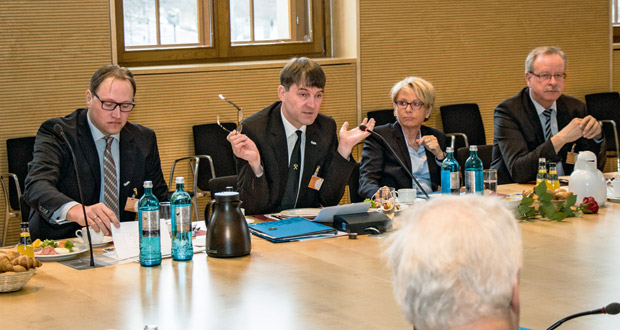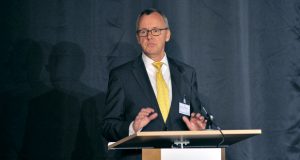35 bn t of raw materials are mined annually around the world. Germany produces the majority of the raw materials it needs autonomously. In 2015, their total value amounted to 13.4 bn €. Handling the consequences of mining responsibly plays a crucial role in the acceptance of mining by the population – as political decision-makers are aware. At a parliamentary breakfast on 8th March 2017, Georg Agricola Technical University (THGA), Bochum/Germany, briefed interested members of the German parliament about research and teaching in the field of sustainable raw materials recovery (Figure 1). The brief focussed on the activities of the world‘s only Research Institute of Post-Mining (FZN), which is located at THGA. Bernd Westphal, spokesman for the SPD Committee and Working Group on Economy and Energy, proposed the parliamentary breakfast together with Manfred Freitag, Managing Director of the THGA holding company, DMT-LB.
THGA President Jürgen Kretschmann explained to the members of the German parliament that Germany covers over 70 % of its raw materials consumption through domestic mining. Globally, more and more raw materials are being produced and consumed. They play an extremely significant role in high-tech applications, such as for generating and using renewable energies. “Research into sustainable raw materials recovery is all the more important – both in Germany and for Germany, because many of the raw materials we require are produced in other countries,” said Kretsch-mann. “The recovery of raw materials is not without consequences. Managing these consequences and minimising risks are now prerequisites for the continued acceptance of mining. No sustainability, no mining.” As the only technical university in Germany that focusses on raw materials science, the THGA has set the topic of post-mining firmly on its scientific agenda.
Bärbel Bergerhoff-Wodopia, Member of the Board of Executives of the RAG-Stiftung, Essen/Germany, outlined the RAG-Stiftung’s funding of the THGA‘s research: “Soon after the new Board of Executives took office, we decided that a centre for post-mining was necessary to conduct research into handling the consequences of mining. We have therefore funded an endowed chair for post-mining at the THGA, which was occupied brilliantly by Prof. Christian Melchers.” According to her, the FZN has developed superbly and made important contributions, especially in terms of research into water retention. “Water retention is a highly sensitive issue in all those areas where coal mining is coming to an end. Independent, scientific projects on this subject contribute to the necessary objectification,” said Bergerhoff-Wodopia.
The endowed chair and Scientific Head of the FZN, Prof. Christian Melchers, gave a presentation on the significance of his area of expertise and the work of the FZN to the members of German parliament: “Germany is a country with a long mining tradition.” In Saxony alone, around 75 % of the populated area was used for mining operations in the past, while there are active or former mining sites in more than 50 % of all communities in North Rhine-Westphalia. This poses major, lasting challenges for society, which are funded by the public sector in many cases – e. g. by Wismut GmbH in the former east German uranium mining industry, and the Lausitzer und Mitteldeutsche Bergbau-Verwaltungsgesellschaft mbH (LMBV) in the lignite mining industry. “Coal mining in the Ruhr, the Saar region and in Ibbenbüren is distinguished by the fact that mining operators pay for the traces of mining activities themselves. Nowhere else in the world is a system like that.” Melchers went on to emphasise that the issues of overground and underground water retention are central to managing the consequences of mining. “This is the exciting question: How high does the mine water need to rise in order to initiate a process which is as sustainable as possible? It makes no ecological or economical sense to permanently remove large volumes of water from great depths in mining regions. A controlled rise in the mine water level is the most sustainable solution in this respect.” He asserted that it is important to ensure that society and decision-makers are made aware of these issues and the scientifically funded processes for finding solutions to them. (THGA/Si.)

